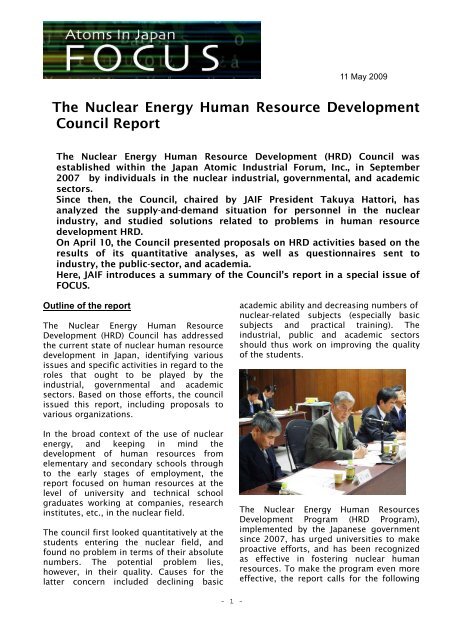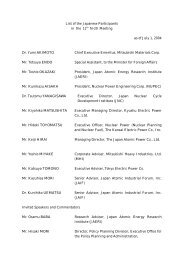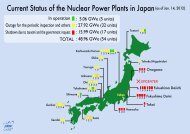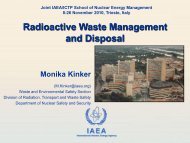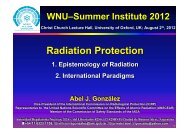The Nuclear Energy Human Resource Development Council Report
The Nuclear Energy Human Resource Development Council Report
The Nuclear Energy Human Resource Development Council Report
Create successful ePaper yourself
Turn your PDF publications into a flip-book with our unique Google optimized e-Paper software.
11 May 2009<br />
<strong>The</strong> <strong>Nuclear</strong> <strong>Energy</strong> <strong>Human</strong> <strong>Resource</strong> <strong>Development</strong><br />
<strong>Council</strong> <strong>Report</strong><br />
<strong>The</strong> <strong>Nuclear</strong> <strong>Energy</strong> <strong>Human</strong> <strong>Resource</strong> <strong>Development</strong> (HRD) <strong>Council</strong> was<br />
established within the Japan Atomic Industrial Forum, Inc., in September<br />
2007 by individuals in the nuclear industrial, governmental, and academic<br />
sectors.<br />
Since then, the <strong>Council</strong>, chaired by JAIF President Takuya Hattori, has<br />
analyzed the supply-and-demand situation for personnel in the nuclear<br />
industry, and studied solutions related to problems in human resource<br />
development HRD.<br />
On April 10, the <strong>Council</strong> presented proposals on HRD activities based on the<br />
results of its quantitative analyses, as well as questionnaires sent to<br />
industry, the public-sector, and academia.<br />
Here, JAIF introduces a summary of the <strong>Council</strong>’s report in a special issue of<br />
FOCUS.<br />
Outline of the report<br />
<strong>The</strong> <strong>Nuclear</strong> <strong>Energy</strong> <strong>Human</strong> <strong>Resource</strong><br />
<strong>Development</strong> (HRD) <strong>Council</strong> has addressed<br />
the current state of nuclear human resource<br />
development in Japan, identifying various<br />
issues and specific activities in regard to the<br />
roles that ought to be played by the<br />
industrial, governmental and academic<br />
sectors. Based on those efforts, the council<br />
issued this report, including proposals to<br />
various organizations.<br />
In the broad context of the use of nuclear<br />
energy, and keeping in mind the<br />
development of human resources from<br />
elementary and secondary schools through<br />
to the early stages of employment, the<br />
report focused on human resources at the<br />
level of university and technical school<br />
graduates working at companies, research<br />
institutes, etc., in the nuclear field.<br />
<strong>The</strong> council first looked quantitatively at the<br />
students entering the nuclear field, and<br />
found no problem in terms of their absolute<br />
numbers. <strong>The</strong> potential problem lies,<br />
however, in their quality. Causes for the<br />
latter concern included declining basic<br />
academic ability and decreasing numbers of<br />
nuclear-related subjects (especially basic<br />
subjects and practical training). <strong>The</strong><br />
industrial, public and academic sectors<br />
should thus work on improving the quality<br />
of the students.<br />
<strong>The</strong> <strong>Nuclear</strong> <strong>Energy</strong> <strong>Human</strong> <strong>Resource</strong>s<br />
<strong>Development</strong> Program (HRD Program),<br />
implemented by the Japanese government<br />
since 2007, has urged universities to make<br />
proactive efforts, and has been recognized<br />
as effective in fostering nuclear human<br />
resources. To make the program even more<br />
effective, the report calls for the following<br />
- 1 -
actions, among others: (1) increasing<br />
international efforts; (2) supporting bold<br />
efforts, such as establishing new courses;<br />
(3) promoting cooperation among<br />
universities, including the joint use of<br />
educational and research facilities; and (4)<br />
cooperating with local with nuclear power<br />
plants.<br />
In surveys through extensive interviews with<br />
parties both within and outside the nuclear<br />
world, many opinions were heard to the<br />
effect that efforts in human resource<br />
development should recognize the<br />
following three points:<br />
-- Making the nuclear world itself attractive<br />
to students.<br />
-- Promoting education both at school and<br />
within companies.<br />
-- Enhancing public understanding and<br />
confidence in nuclear energy.<br />
With those points in mind, comprehensive<br />
surveys were conducted among students<br />
participating in the HRD Program, as well as<br />
among employees who had recently entered<br />
the nuclear industry. <strong>The</strong> results indicate<br />
the following actions as useful in motivating<br />
students to desire to work for the nuclear<br />
industry:<br />
(1) Exposing students yet undecided about<br />
their future direction to nuclear-related<br />
technological content (more professional<br />
than general knowledge);<br />
(2) Providing students with information on<br />
the standing of nuclear generation and the<br />
nuclear industry within society.<br />
(3) Having the nuclear industry directly<br />
provide students with information.<br />
- 2 -<br />
Also, internationally-minded human<br />
resources need to be developed, given the<br />
expansion and promotion of R&D by nuclear<br />
enterprises overseas. In that respect,<br />
several measures need to be implemented,<br />
including promoting internships to overseas<br />
research institutes, offering classes by<br />
foreign instructors in Japan, and supporting<br />
a system to accept foreign students. In<br />
addition, measures to help Japanese<br />
personnel participate in international<br />
conferences and international organizations<br />
should be addressed from now on.<br />
Diversified human resources are also<br />
necessary for the development of industries<br />
in Japan generally, for which the use of<br />
foreign human resources should be<br />
promoted.<br />
Finally, six basic efforts need to be made by<br />
nuclear related parties in the industrial,<br />
government and academic sectors, as<br />
follows:<br />
(1) Carrying out education in science and<br />
mathematics, and increasing<br />
understanding on energy and the<br />
environment at the elementary and<br />
secondary levels, to entice more<br />
students to follow careers in the<br />
industrial world.<br />
(2) More effectively conveying the<br />
attractions of the nuclear world to<br />
students, and encouraging good<br />
students to major in nuclear-related<br />
engineering.<br />
(3) Developing or improving educational<br />
infrastructure at universities and<br />
elsewhere, with university education<br />
incorporating the needs of the nuclear<br />
industry.<br />
(4) Developing sufficient numbers of young<br />
researchers in the area of fundamental<br />
technology.<br />
(5) Motivating internationally-minded<br />
personnel to work in the nuclear world<br />
by increasing understanding about<br />
nuclear energy and related subjects.<br />
(6) Providing the environment and<br />
motivation to enable people to acquire<br />
knowledge and skills and to continue<br />
developing their abilities after<br />
employment.
Commonly recognizing those basic targets,<br />
academic, industrial and governmental<br />
nuclear-related organizations should<br />
promote specific human resource<br />
development efforts according to their<br />
specific organizational circumstances and<br />
other conditions.<br />
Specific efforts to be made in each sector<br />
are as follows:<br />
In the nuclear industry, further efforts<br />
should be made to help elementary,<br />
secondary and upper secondary school<br />
students better understand nuclear energy,<br />
including the distribution of materials,<br />
nuclear classes on demand, the staging of<br />
facility tours, and support for the<br />
implementation of energy and<br />
environmental education.<br />
organization to maintain and develop<br />
personnel who will contribute to the growth<br />
of the nuclear industry.<br />
<strong>The</strong>re are various issues in human resource<br />
development other than those taken up in<br />
the report, and the council will address<br />
them one by one in accordance with their<br />
importance and urgency. It is also<br />
important to work on activities continuously<br />
and in depth, with the HRD <strong>Council</strong><br />
continuing to play a central role.<br />
Japan Atomic Industrial Forum, Inc.<br />
Cooperating with universities and other<br />
schools, moreover, the nuclear industry<br />
needs to carry out such activities as<br />
conducting joint research, establishing<br />
donated courses, dispatching lecturers,<br />
hosting facility tours, and offering<br />
internship programs.<br />
Universities, etc., should carry out<br />
independent, strategic efforts consistent<br />
with their own characters and identities,<br />
and actively utilize external resources of<br />
other universities, industries, research<br />
institutes, and so forth. <strong>The</strong>y should also<br />
realize long-term, self-supported education<br />
and research, making best use of the HRD<br />
Program.<br />
In order for students to acquire the various<br />
skills that will be necessary after going out<br />
into the world, universities and the other<br />
institutions should make completion<br />
requirements stricter. Students in doctoral<br />
programs should receive a broader range of<br />
education to develop wider abilities.<br />
<strong>The</strong> Japanese government is expected to<br />
continue the HRD Program, which has been<br />
steadily producing good results.<br />
Based on the directions proposed in the<br />
report, specific efforts will be made by each<br />
- 3 -


